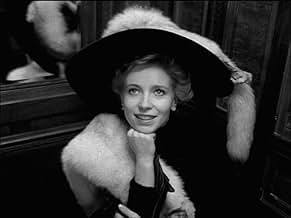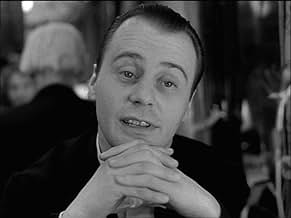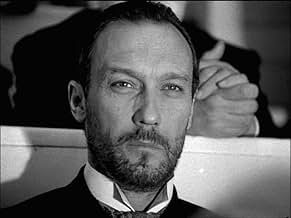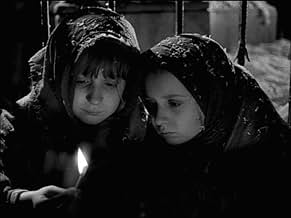AVALIAÇÃO DA IMDb
7,0/10
2,1 mil
SUA AVALIAÇÃO
Adicionar um enredo no seu idiomaTwo twin sisters, who grew up separately, Dóra, a pseudo-aristocrat, and Lili, an anarchist bomber, are reunited through Z, a mysterious traveller of the luxurious Orient-Express.Two twin sisters, who grew up separately, Dóra, a pseudo-aristocrat, and Lili, an anarchist bomber, are reunited through Z, a mysterious traveller of the luxurious Orient-Express.Two twin sisters, who grew up separately, Dóra, a pseudo-aristocrat, and Lili, an anarchist bomber, are reunited through Z, a mysterious traveller of the luxurious Orient-Express.
- Prêmios
- 1 vitória no total
Avaliações em destaque
Hungarian female director Ildikó Enyedi's ON BODY AND SOUL (2017), her first feature in 18 years, is the recipient of 2017 Golden Berlin Bear, so it is high time to reappraise her under-seen body of work, here comes her dazzling Black-and-White feature debut MY TWENTIETH CENTURY.
Capitalizing on the monochromatic mystique of a bygone era, the story focuses on identical twins Dora and Lili (Segda, a ), born in 1880, after their mother died and selling matches on a freezing cold night in Budapest, they are snatched away and lead separate lives. Their path will converge again in 1900, the turn of the century on the Oriental Express. Dora, a pert minx, dallies her way through men's courtship and rooks them as much as she can, whereas Lili, a dour-looking revolutionist, carries on a bomb-attacking mission with steely resolution. Unbeknown to each other, both's lives will soon be entangled with a mysterious middle-aged man Z (Yankovskiy, a magnetic cipher-like presence), a constellation of vignettes are engendered by alternating between Dora and Lili in their aggressive/passive sexual/power tugs-of-war with an inscrutable Z: playing hard to get, coquettishly libidinous, complete obedient, that is the gist of femininity's unabashed duality, as a riposte to the sidebar, where the young Austrian philosopher Otto Weininger (played by Paulus Manker with gusto and ridicule), who would kill himself in 1903 at the age of 23, rants about his misogynistic take on women's "whore/mother" dichotomy in front of a flock of suffragettes. In the hyper-surreal denouement, Dora and Lili finally meet inside a hall of mirrors (a motif almost runs to platitude), later arrives Z, ushered by a mule, a metaphor of men's intransigence and if one recalls, it also heralds the twins' separation at the first place.
The surreal touch is what makes Enyedi's daring debut a novelty, picking up the baton from erstwhile Mitteleuropa New Wave standard bearers (Vera Chytilová's DAISIES 1966, Jaromil Jires' VALERIE AND HER WEEK OF WONDERS 1970, to name a few within the knowledge of this reviewer), Enyedi interpolates these elements to impart her rumination on more abstract aspects: nature vs. human (the monologue of a Zoo-trapped chimp, a lab dog on the lam confronting a railway train, other topographic arrangements), cosmology (Greek chorus of glistening stars), and technology (Edison's discovery opens and bookends the film, cinematograph, etc.), but this smorgasbord of ideas and conceptions fail to organically connect with the diegesis, a rookie indulgence for starters, often bite off more than one can chew - making every film as the last one. This approach does impinge on the cohesion of its central narrative, which could have been marshaled into a more scintillating doppelgänger charade. Yet, if eccentricity and diverse nuggets are what the filmmaker intends to chalk up, Enyedi has done a bang-up job!
Experimental but mesmerizing, compendious yet idiosyncratic, and particularly has a unique eye for lightning and mise-en-scène, MY TWIENTH CENTURY is a symphonic pastiche of cinematic tricks and an unsparing feminist manifesto beckons for a more effervescent reception.
Capitalizing on the monochromatic mystique of a bygone era, the story focuses on identical twins Dora and Lili (Segda, a ), born in 1880, after their mother died and selling matches on a freezing cold night in Budapest, they are snatched away and lead separate lives. Their path will converge again in 1900, the turn of the century on the Oriental Express. Dora, a pert minx, dallies her way through men's courtship and rooks them as much as she can, whereas Lili, a dour-looking revolutionist, carries on a bomb-attacking mission with steely resolution. Unbeknown to each other, both's lives will soon be entangled with a mysterious middle-aged man Z (Yankovskiy, a magnetic cipher-like presence), a constellation of vignettes are engendered by alternating between Dora and Lili in their aggressive/passive sexual/power tugs-of-war with an inscrutable Z: playing hard to get, coquettishly libidinous, complete obedient, that is the gist of femininity's unabashed duality, as a riposte to the sidebar, where the young Austrian philosopher Otto Weininger (played by Paulus Manker with gusto and ridicule), who would kill himself in 1903 at the age of 23, rants about his misogynistic take on women's "whore/mother" dichotomy in front of a flock of suffragettes. In the hyper-surreal denouement, Dora and Lili finally meet inside a hall of mirrors (a motif almost runs to platitude), later arrives Z, ushered by a mule, a metaphor of men's intransigence and if one recalls, it also heralds the twins' separation at the first place.
The surreal touch is what makes Enyedi's daring debut a novelty, picking up the baton from erstwhile Mitteleuropa New Wave standard bearers (Vera Chytilová's DAISIES 1966, Jaromil Jires' VALERIE AND HER WEEK OF WONDERS 1970, to name a few within the knowledge of this reviewer), Enyedi interpolates these elements to impart her rumination on more abstract aspects: nature vs. human (the monologue of a Zoo-trapped chimp, a lab dog on the lam confronting a railway train, other topographic arrangements), cosmology (Greek chorus of glistening stars), and technology (Edison's discovery opens and bookends the film, cinematograph, etc.), but this smorgasbord of ideas and conceptions fail to organically connect with the diegesis, a rookie indulgence for starters, often bite off more than one can chew - making every film as the last one. This approach does impinge on the cohesion of its central narrative, which could have been marshaled into a more scintillating doppelgänger charade. Yet, if eccentricity and diverse nuggets are what the filmmaker intends to chalk up, Enyedi has done a bang-up job!
Experimental but mesmerizing, compendious yet idiosyncratic, and particularly has a unique eye for lightning and mise-en-scène, MY TWIENTH CENTURY is a symphonic pastiche of cinematic tricks and an unsparing feminist manifesto beckons for a more effervescent reception.
Hungary's submission for Best Foreign Language Film to the 62nd Academy Awards is a kaleidoscopic look at the turn of the last century. Ildikó Enyedi's "Az én XX. Századom" ("My 20th Century" in English) mostly focuses on a pair of sisters - one an aristocrat, the other an anarchist - while also showing the technological innovations that came about as the nineteenth century was ending. The movie incorporates cats, a donkey, and even sexuality to tell its multi-layered story, all done to perfection. It might be hard to take in, but you should still see it. The cast includes Dorota Segda, Oleg Yankovsky, Paulus Manker, Péter Andorai, Gábor Máté and Gyula Kéry.
It was probably appropriate to release this depiction of a new era just as Hungary was about to enter a new era, breaking free of the Soviet boot. Enyedi put off directing for a while after this, returning with 2017's Academy Award-nominated "On Body and Soul", about a relationship between two people suffering from disabilities.
It was probably appropriate to release this depiction of a new era just as Hungary was about to enter a new era, breaking free of the Soviet boot. Enyedi put off directing for a while after this, returning with 2017's Academy Award-nominated "On Body and Soul", about a relationship between two people suffering from disabilities.
A film of great charm, beauty and invention and yet it's almost totally unknown, Ildiko Enyedi's debut "My Twentieth Century" is ripe for rediscovery. It's the story of twin girls, Dora and Lili, (both played by Dorotha Segda), born in Budapest in 1880 but separated in early childhood, one growing up to be an anarchist, the other a courtesan. It's also the story of the inventions of one Thomas Edison and it's wonderfully shot in black and white, with nods to the silent cinema, by Tibor Mathe. Darting all over the place with no concessions to reality it feels, at times, like it could have been made by Max Ophuls early in his career and at other times like something from the Czech New Wave and you might even be forgiven for thinking that Miguel Gomes may have seen this before making "Tabu". Gorgeous, mysterious and unmissable.
electricity...the stars talking...a dog with electrodes on its head...a whore and a terrorist...the pigeons...the donkey...siberia...what the freakin hell? this one either went right over my head. nothing else to say about this one but i'm supposed to fill up 4 lines. rating -6/10.
I have the LaserDisk. For those who didn't understand, it's an allegory for the 20th Century of Hungary. The two leading female roles are representative of a dichotomy of Hungarian National thought. A key scene is the one in which the leading lady (Dora?) allows herself to have sex with (or maybe seduces?)the male lead (who represents the Hungarian people/nation itself) and then allows herself to be re-serviced on board the ship (Fiume) by the German. Hungarian history is replete with a love/hate relationship with Germany. The Hungarian people have been very religious (read the lyrics to the Hungarian National Hymn), hence the intervention of the angels to protect the two girls. Hungary, in all its national aspirations and doubts, is protected by God.
The explanation is the scene in the hall of mirrors, in the angels' discussion of the male lead's dilemma, i.e. of loving both girls (or bring trapped by the Hungarian national dichotomy) but not understanding why or how to resolve his problem.
The ending is confusing. It appears to be a boat's passage into a limitless lake or ocean, perhaps suggesting an uncertain future for the nation and its people.
The explanation is the scene in the hall of mirrors, in the angels' discussion of the male lead's dilemma, i.e. of loving both girls (or bring trapped by the Hungarian national dichotomy) but not understanding why or how to resolve his problem.
The ending is confusing. It appears to be a boat's passage into a limitless lake or ocean, perhaps suggesting an uncertain future for the nation and its people.
Você sabia?
- CuriosidadesVoted as one of the "12 Best Hungarian Films" ("New Budapest 12") by Hungarian filmmakers and critics in 2000.
- Erros de gravaçãoThe film takes place around 1900. In the projection room scene, among Méliès' films, there is an extract from "The General" by Buster Keaton which was shot in 1926. That is 26 years later.
- ConexõesFeatured in Senhoras e Senhores: Corte Final (2012)
- Trilhas sonorasMacbeth, Act 3: Coro e ballabile
Ondine e silfidi""
Written by Giuseppe Verdi
Performed by Andrea Mate, Budapest Symphony Orchestra, Hungarian Radio and Television Chorus, Istvan Gati, Janos Bandi, Janos Tóth, Katalin Pitti, Kolos Kováts, Lamberto Gardelli, Mária Zádori, Peter Kelen, Piero Cappuccilli, Sylvia Sass, Tamás Bátor
Principais escolhas
Faça login para avaliar e ver a lista de recomendações personalizadas
- How long is My Twentieth Century?Fornecido pela Alexa
Detalhes
- Data de lançamento
- Países de origem
- Idioma
- Também conhecido como
- My Twentieth Century
- Locações de filme
- Empresas de produção
- Consulte mais créditos da empresa na IMDbPro
Bilheteria
- Faturamento bruto nos EUA e Canadá
- US$ 682.016
- Tempo de duração1 hora 42 minutos
- Cor
- Mixagem de som
- Proporção
- 1.33 : 1
Contribua para esta página
Sugerir uma alteração ou adicionar conteúdo ausente

Principal brecha
By what name was O Meu Século XX (1989) officially released in India in English?
Responda


























